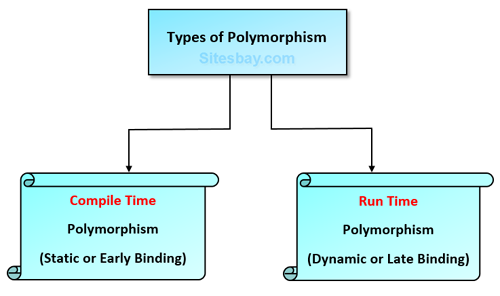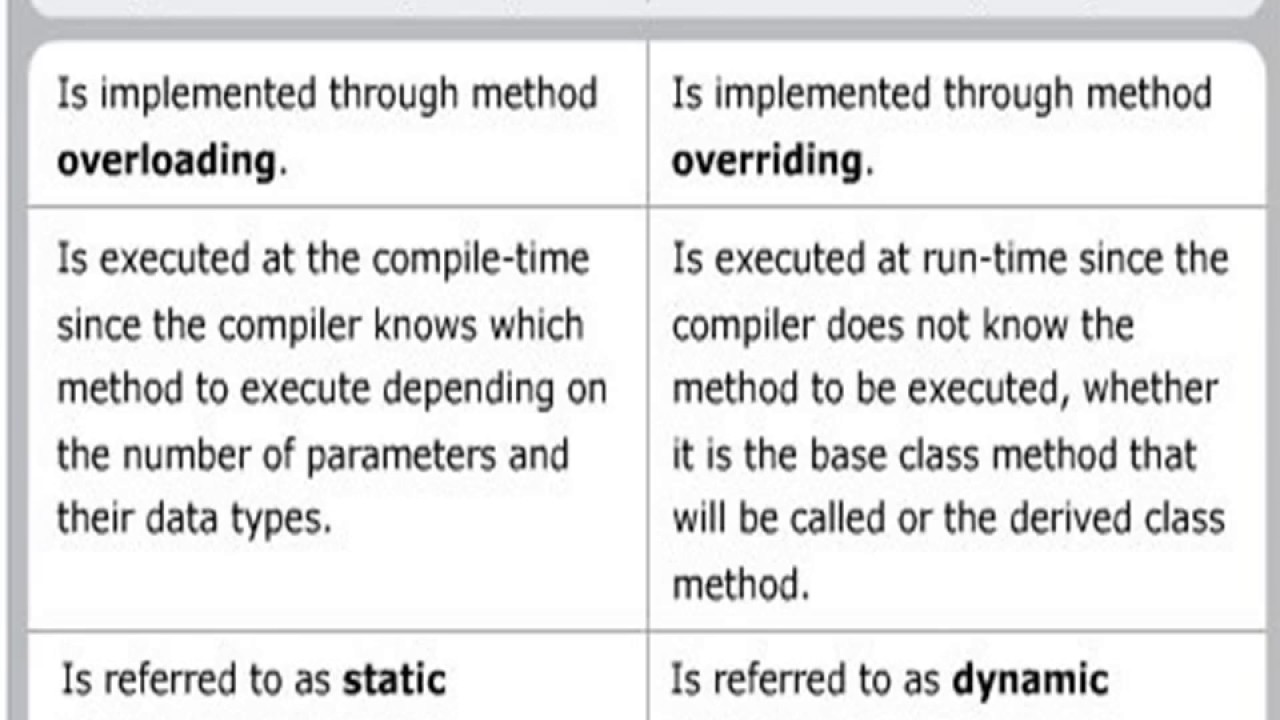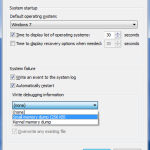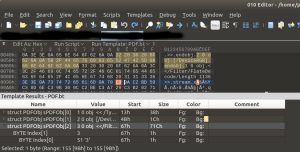Table of Contents
Updated
Recently, some of our readers came across a famous error code with an example of run-time and compile-time polymorphism in Java. Several factors can cause this problem. Let’s discuss some of them below. g.It is a concept that allows us to accomplish individual tasks in several ways. There are two types of polymorphism, one is compile-time polymorphism and the other is true run-time polymorphism. Method overloading is a compile-time polymorphism argument, and route rewriting is an example of run-time polymorphism.
g.
Promise polymorphism means multiple forms. In simple key phrases, we can define polymorphism as the ability to display a specific message in several forms. In this tutorial, we see the difference between repetitive polymorphisms, compile time and run time.
Compile-time polymorphism: whenever an element is associated with its compile-time functionality, it is called compile-time. Temporary polymorphism. Compile-time Java that knows the method on the way to the call by checking the method signatures. This is also known as compilation polymorphism, or stationary or early binding. Compile-time polymorphism is satisfied by method overloading. Method overloading indicates that your company may have multiple functions with the same name in a class, including a different prototype. Function overloading is one of the opposite ways to achieve polymorphism. It depends on the technology and the type of polymorphism we are using. In Java, most function overloads reach compile time. This is considered an example of how polymorphism can be observed at compile time.
Which is example of runtime time polymorphism?
Method substitution is a representation of runtime polymorphism. With method substitution, the great subclass overloads the method with the actual signature, just like in its superclass. Reference type checking is done at compile time.
Run-time polymorphism: wheneverand the related object is provided with run-time functionality, this is called run-time polymorphism. Runtime polymorphism can be obtained by replacing the solution. Java Virtual defines a machine, a natural method to be called at runtime, not at compile time. We talk too much about dynamic or late binding. The substitution methods indicate that the child class has the same option as declared in the parent class. This means that when a child class provides the final implementation of a method provided by one of its parent tutorials, it is called a schema replacement. Below is an example where polymorphism can be observed during playback.
The following shows the difference between runtime polymorphism combined with assembly polymorphism in blackjack tables:
| Sr .Time no | Compile Polymorphism | Runtime Polymorphism |
|---|---|---|
| 1 | At compile time, polymorphism calls are resolved by the compiler. | In Time run Polymorphism bodiesephone is not resolved by the compiler. |
| 2 | This is also known as anchor, early static hold, and override. | has also proven its dynamic binding, late binding as well as overriding. |
| 3 | Overloading methods are our own compile-time polymorphism where multiple methods have the same name with different parameters or private and different types unsecured return. | Method substitution takes some time to work with polymorphism of the same method with approximately the same parameters or signature, but related in different classes. |
| 4 | This is achieved by overloading functions as well as operators. | This is achieved through virtual applications and pointers. |
| 5 | It offers fast execution because the plan to be executed is at an early stage. You need to know the compile time. | It offers lower execution compared to the early join because the method it uses most to execute is known inlead time. Time |
| 6 | Compilation polymorphism is less flexible because everything is done at compile time. | Runtime Polymorphism is much more flexible because everything is done at runtime. |

To the attention of readers! However, don’t stop learning. Get all the core concepts of Java Foundation and Collections with Fundamentals, the complete Java and Java Collections course at an affordable student price, and get industry-organized. To complete your preparation for learning the DS Algo language and more, please read the entire interview preparation course.
Java
Java
In some of the last few tutorials, we’ve discussed polymorphism in Java. In this tutorial, we will see the types of polymorphism. There are two types of polymorphism in Java:
1) Static polymorphism is also known as compile time polymorphism
2) Dynamic polymorphism known as runtime polymorphism
Compile-time Polymorphism (or Static Polymorphism)
What is compile time polymorphism in java with example?
Updated
Are you tired of your computer running slow? Annoyed by frustrating error messages? ASR Pro is the solution for you! Our recommended tool will quickly diagnose and repair Windows issues while dramatically increasing system performance. So don't wait any longer, download ASR Pro today!

Polymorphism resolved at compile time is called static field morphism. Method overloading is an example of compilation plan polymorphism.
Method overloading: This allows us to get more than one method with a specific name if the method parameters differ in the number, order, and dates of different parameter types. We’ve already discussed method overloading here: Read what reads in the expert guide: Method Overloading in Java
Static Polymorphism Example
Method overloading is one of the main ways to support static polymorphism in Java. Here, our company has two definitions of the same add () strategies, the method of which is added is determined by a list of parameters at compile time. For this reason, this is also known as compile-time polymorphism.
SimpleCalculator class int add (int a, int b) return a + b; int add (int this, int b, int c) returns a + b + c; public class demonstration Plain static void main (String args []) SimpleCalculator obj = surprisingly SimpleCalculator (); System.out.println (obj.add (10, 20)); System.out.println (obj.add (10, 20, 30));
Runtime Polymorphism (Fig Dynamic Polymorphism)

This is also accepted as a dynamic dispatch method. Dynamic polymorphism is also the process by which market demand for a priority learning method is addressed, which is why it is called learning polymorphism. I have already covered the Life Replacement Method in detail in a separate tutorial, see: Method Replacement in Java.
Example
In this example, almost both classes have ABC and XYZ. ABC is the parent class and the XYZ class is definitely a child class. The child state override is the myMethod () method of the relative class. In this example, we have assigned the subdivision of the child objects to the parent class reference. Time. The type of the object determines which version of the method is called (not the reference type).
To understand the concept of rewriting, you need to have a basic understanding of Java inheritance.
Does java support compile time polymorphism illustrate with an example?
An example of linked static polymorphism Method overloading is a core part of how Java supports simple polymorphism. Here we have two definitions of the same add () method that should normally be called, defined by all parameter lists at compile time. This is why it is also known for compile-time polymorphism.
Rez methodrecordings
While it is almost certain that an overloaded method will be called by an academic reference parent, the type of the object dictates that sometimes this method should be executed. So everything is determined at runtime.
Because they are classes, the parent child class and group share the same animalSound method. Another method (child class or class) called fathers and mothers is determined by the teachings of the JVM.
ABC obj = new ABC ();obj.maMethod ();// Will this call myMethod from parent ABC ()XYZ obj = new XYZ ();obj.maMethod ();// This can be done by calling myMethod () on the XYZ child classABC obj = new XYZ ();obj.myMethod ();// This will call the XYZ child class myMethod ()
In the third general case, the child charm method should be executed, since the mode to be executed is determined by the type of the object, and since my object belongs to the child class, our version of the child class myMethod () is usually named.
Speed up your computer today with this simple download.Советы по исправлению полиморфизма времени выполнения и компиляции в Java
Tips Om Voorbeeldruntime En Compilatietijdpolymorfisme In Java Op Te Lossen
Wskazówki, Jak Naprawić Polimorfizm Przykładowego Czasu Wykonywania I Czasu Kompilacji W Javie
Tips För Att Fixa Exempel På Körtid Och Kompileringstidspolymorfism I Java
Consejos Para Corregir El Polimorfismo En Tiempo De Ejecución Y Tiempo De Compilación De Muestra En Java
Tipps Zum Beheben Von Beispiellaufzeit- Und Kompilierzeitpolymorphismus In Java
Suggerimenti Per Correggere Il Polimorfismo In Fase Di Esecuzione E Di Compilazione Di Esempio In Java
Java에서 샘플 런타임 및 컴파일 시간 다형성을 수정하는 팁
Conseils Pour Corriger Les Exemples De Polymorphisme D’exécution Et De Compilation En Java
Dicas Para Corrigir O Polimorfismo Em Tempo De Execução E De Compilação De Amostra Em Java








